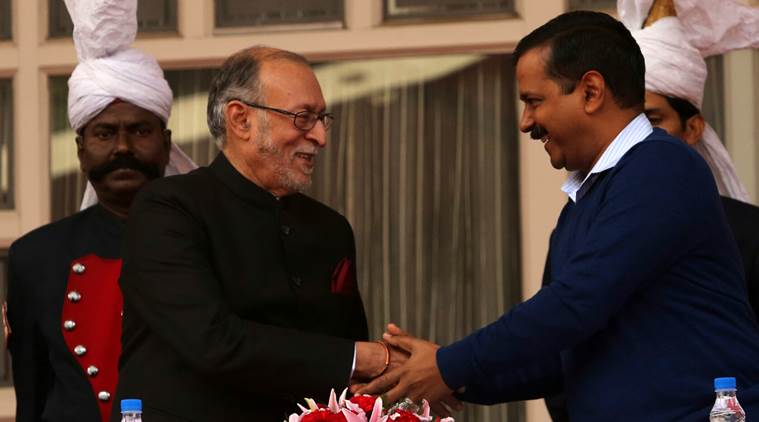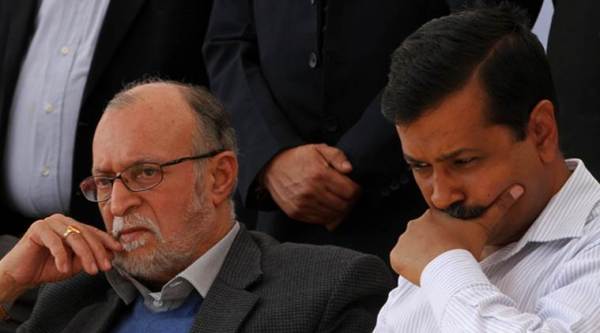 Supreme Court verdict on Delhi CM Arvind Kejriwal vs Delhi LG Anil Baijal LIVE UPDATES: L-G Anil Baijal or CM Arvind Kejriwal — Supreme Court to decide who holds the reins of Delhi. (Express Photo/Praveen Khanna/File)
Supreme Court verdict on Delhi CM Arvind Kejriwal vs Delhi LG Anil Baijal LIVE UPDATES: L-G Anil Baijal or CM Arvind Kejriwal — Supreme Court to decide who holds the reins of Delhi. (Express Photo/Praveen Khanna/File)
The Supreme Court Wednesday said the Delhi Lieutenant Governor cannot act independently and must take the aid and advise of the Council of Ministers. It observed that the national capital enjoys special status and is not a full state. Hence, the role of the L-G is different than that of a Governor. The apex court also observed that neither the state nor the L-G should feel lionized, but realise they are serving Constitutional obligations. “There is no space for absolutism or anarchy in our Constitution,” the SC stated.
Delhi Chief Minister Arvind Kejriwal had accused L-G Anil Baijal of taking decisions of an elected government and delaying work by sitting on files. The Centre, which appoints the L-G, had contended that “for any Centrally administered territory… and especially Delhi in respect of its unique position… responsibility is on the shoulders of the Union Government”.
The matter was heard by a five-judge bench which was headed by CJI Dipak Misra and comprised Justice A K Sikri, Justice A M Khanwilkar, Justice D Y Chandrachud and Justice Ashok Bhushan. It had reserved its verdict on December 6, 2017.
 Lieutenant Governor Anil Baijal and Delhi Chief Minister Arvind Kejriwal (Express Photo/Renuka Puri/File)
Lieutenant Governor Anil Baijal and Delhi Chief Minister Arvind Kejriwal (Express Photo/Renuka Puri/File)
The spokesperson for the Home Ministry tells The Indian Express: 'A copy of SC judgment is available with the MHA and due deliberation will be held, appropriate action will be taken.'
BJP MLA and Leader of Opposition in the Delhi Assembly Vijender Gupta has reacted to the SC verdict saying that AAP should now stop demanding full statehood for the national capital and follow the law. "It is now decided that Delhi is a UT. So, the AAP and Chief Minister Arvind Kejriwal should stop raising the full statehood demand," Gupta was quoted as saying by PTI.
Delhi deputy CM Manish Sisodia on SC verdict: "This is good because the L-G was slowing down development, stopping work because the LG was asking unnecessary questions," The Indian Express reports. Read his entire statement here.
The SC ruling finally settled the issue of sharing of powers between the Delhi government and Lieutenant Governor. This has been at the centre of every debate involving executive decisions taken by the government ever since the AAP returned to power for the second time in 2015. Here's a backgrounder on the issues between the CM and L-G, and .
Settling the power tussle between the Arvind Kejriwal-led Delhi government and the Lieutenant Governor, the Supreme Court on Wednesday said that L-G cannot act independently in making decisions and must act on the aid and advice of the Council of Ministers. Click here for top quotes from the SC judgment.
Delhi Chief Minister Arvind Kejriwal will chair a meeting with Cabinet ministers at 4 pm at his residence to discuss critical projects of public importance which were blocked so far, he says.
Former Delhi chief minister Sheila Dikshit reacts to the verdict. She says, "I think what the SC has said is very clear. As per Article 239 (AA) of the Constitution, Delhi is not a state, it is a Union Territory. If the state government and L-G don't work together, then Delhi will face problems," reported ANI.
AAP spokesperson Raghav Chadha says the government of Delhi and democracy has been restored.
The tussle between the Delhi CM and the L-G had started after Kejriwal took office for the second time in 2015. Najeeb Jung was the Lieutenant-General of Delhi then. Jung, however, resigned and Anil Baijal took over but the power struggle continued.
Delhi deputy CM Manish Sisodia says the Supreme Court has made an important decision today, and thanks the people of Delhi. "67/3 was a historical decision of the public of Delhi, today the Hon Supreme Court has made another important decision. I thank the public of Delhi for this decision in which the Hon'ble Court has told the public to be the Supreme," he says.
The five-judge bench of the Supreme Court today, in a unanimous verdict, has stated that the real power rests with the Council of Ministers. The Delhi government has the power to legislate on all issues except land, police and public order, as per provisions in the Constitution.
Delhi Chief Minister Arvind Kejriwal tweets, "A big victory for the people of Delhi...a big victory for democracy..."
Here's what the Supreme Court has stated:
* Delhi enjoys special status, is not a full state* Status of L-G is not that of a Governor. L-G cannot act independently, or be obstructionist. He must take the advice of Council of Ministers* Parliament has the power to make laws for Delhi on state, concurrent list* Delhi govt can legislate on all subjects except land, police and public order* Neither state nor LG should feel lionized, but realise they are serving Constitutional obligations* There is no space for absolutism or anarchy in our Constitution
The Supreme Court has said that Delhi is not a full state and that the L-G has no independent power. The status of the L-G is not similar to that of the Governor of other states. While the Parliament has the power to make laws for Delhi on subjects in state and concurrent list, the elected government can also make laws on all subjects expect land, police and public order. If Parliament makes a law, the executive power of the state must conform to the law made by Parliament. The Supreme Court also observed that the L-G must act on the aid and advise of the Council of Ministers to implement the President's decision.
CJI Dipak Misra, who is reading out his judgment in the case, says the L-G cannot act independently and must take advice from the Council of Ministers. The Council has to inform the L-G of its decisions. The CJI says both the state and the Union must act in harmony and enjoy a healthy relationship.
Chief Justice of India Dipak Misra is reading his judgment. He says the state and Union must be healthy, the two must collaborate and take decisions in consonance of the Constitution. He adds that the L-G has to consult the Council of Ministers and cannot act independently unless written in the Constitution. He reiterated that the LG holds different powers from Governors of other states.
The verdict will be delivered any minute now. The judges, who have reportedly assembled in court, will begin reading out their judgments. Stay tuned!
The AAP, on Tuesday, launched its campaign for "full statehood". This is also a demand that has been made by the BJP in the past. In fact, back in 2014, Prime Minister Narendra Modi had said the Centre will grant the national capital statehood. With the AAP being elected with a spectacular mandate, the party's demand for statehood could seem logical.
The first matter that will be taken up this morning is that of the Govt of Delhi vs the Union of India. We can expect news shortly!
In its counter to the AAP's plea, the Centre said that the Delhi government cannot have the "exclusive" executive powers as it would be against national interests. Referring to the 1989 Balakrishnan committee report, the Centre reflected in the reasons behind why Delhi was not granted full statehood. The Centre had referred to the Constitution, the 1991 Government of National Capital Territory of Delhi Act and the Transaction of Business of the Government of National Capital Territory of Delhi Rules to drive home the point that the President, the union government and the LG had supremacy over city dispensation in administering the national capital.
This is not the first time there has been a tussle for power between the CM and the L-G, who is appointed by the Centre. In fact, even during former Delhi CM Sheila Dikshit tenure, whose own party was in power at the Centre, there was a lot of pushing, cajoling, negotiating and persuading to do things.
There is ambiguity in who holds power in the national capital as Delhi, as per Schedule I of the Constitution, is a Union Territory. In Delhi, the elected government has the right to legislate on nearly all subjects. The L-G of Delhi, meanwhile, has "Executive Functions" that allow him to exercise his powers in matters connected to public order, police and land. To give the Delhi government control over land, police and public order a constitutional amendment is necessary.
The AAP, in its petition, said that the chief minister and the council of ministers had the legislative power to make laws as well as the executive authority to enforce the enacted statutes. Accusing L-G of making a “mockery of democracy”, the Kejriwal government accused Anil Baijal of sitting on files and hindering the "development" projects in the national capital.
The party also argued that the LG was either taking decisions of an elected government or substituting them without having any power and that a "harmonious interpretation" of Article 239AA of the Constitution was needed to fulfill the constitutional mandate for a democratically-elected Delhi government. The article deals with power and status of Delhi.
Senior lawyers had represented the AAP government, including P Chidambaram, Gopal Subramanium, Rajeev Dhavan and Indira Jaising. The Centre, meanwhile, was represented by Additional Solicitor General (ASG) Maninder Singh during the proceedings.
A Constitution bench, headed by CJI Dipak Misra and comprising Justice A K Sikri, Justice A M Khanwilkar, Justice D Y Chandrachud and Justice Ashok Bhushan, is expected to deliver a verdict today. The decision is likely to end the tussle for power between Delhi CM Arvind Kejriwal and L-G Anil Baijal.
The Supreme Court is likely to deliver its verdict on a matter challenging the Lieutenant Governor as the administrative head of the national capital. The apex court, which had reserved its judgment last December, is expected to pass its order at 10.30 am this morning. Follow our LIVE blog for the latest news.